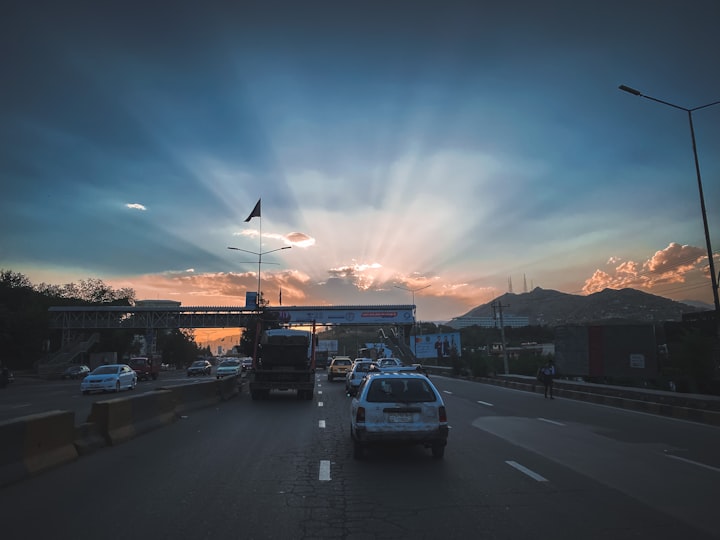This is The End
The shameful debacle in Afghanistan is just another signpost on the seemingly inevitable road to Western decline. But it’s not too late to change course.

Francis Ford Coppola’s surrealistic masterpiece Apocalypse Now begins with helicopters dancing before a jungle backdrop, to the sound of The Doors, just before a napalm strike incinerates the area.
Juxtaposed against the private agonies of Martin Sheen’s Captain Willard, drunk and alone in a Saigon hotel room, the scene depicts the ordeal of Vietnam in miniature. A Vietnamese village is destroyed. An American officer wishes to destroy himself.
I thought about that scene a lot in the past few days.
I have, despite having written of, and read about war extensively, no real experience of the thing. So, it is from popular culture that I must draw. My relatives who fought in World War II are all long dead, and my friends who fought in Afghanistan do not talk about it, much like my uncles did not.
But I think I have read enough history to know when a war is being lost, right before my eyes.
Five weeks ago, President Biden assured us that we would not see a repeat of the frantic April 1975 evacuation from Saigon. Today, we saw the helicopters buzzing over the embassy, evacuating people. If anything, the Kabul evacuation seems much more chaotic than the Saigon effort.
Perhaps if the Pentagon was less concerned with white privilege and pronouns, and more concerned with the business of war, this would’ve gone better.
As much as Biden, Blinken, and the whole sorry lot try to deny the comparisons, it’s right there for everyone to see. America, and this time, the entire NATO alliance, is losing a war on TV, for the whole world to see.
But it is not all Biden’s fault, as much as I see the man as a hollow, senile dupe. It is also Trump’s fault, and Obama’s fault, and Bush’s fault too. We failed in Afghanistan, not, as one Republican put it, “Because of the boots, but because of the suits.”
Our soldiers, my friends among them, fought bravely and well. As in Vietnam, time after time, our enemies were defeated on the battlefield. Unfortunately, that is not enough to win a war. And that, is the point of this essay.
Our way of war is broken, because we are broken. We cannot win, because we defeat ourselves. As Chris Taylor, Oliver Stone’s analogue in Platoon says, “We did not fight the Vietnamese; we fought ourselves.”
I recall visiting a museum in Rome years ago with my wife. The most amazing, modernistic, perceptive art there was from the 4th and 5th Centuries AD. Exactly the time that the Roman Army was losing its hold on the Empire’s frontiers. The once-feared Legions, conquerors of Carthage, Macedon, Sparta, and Gaul, were now reduced to running from hairy barbarians.
They didn’t have helicopters then, you see.
Rome, as we do now, lived at peak affluence, just at the moment its real power was about to tip over the precipice. But why? In terms of numbers, the Roman Army was the strongest it ever had been; unlike the forces of the Republic, the forces of the Late Empire were all long-service professionals. They should’ve conquered all.
The United States has in excess of 1000 nuclear warheads, The Taliban has, so far as we know, zero. Let’s hope it stays that way. The United States and its allies possess powerful air forces, tanks, artillery, and exhaustively trained and conditioned troops led by a professional officer corps.
Yet power on the page is not power in the field. Nuclear weapons are useless in anything but the most dire situations. Firepower must, in the age of Al-Jazeera and CNN, be used sparingly. Even the power of infantry must be used with restraint, lest too many coffins come home.
The apparent power of the West is, it should be obvious now, the power of that guy at the gym who always works his arms, but nothing else. He has raw strength, but no endurance.
We quit, you see. We declare grand goals for a war that should really be about killing a few thousand terrorists and getting out. But no, we want to “nation build.” After twenty years of failing to push the Afghans from the 12th Century into the 21st, we get tired. We lack perseverance. The Taliban does not.
My friends used to tell me, when they did feel like telling stories, about Thursday nights in Kandahar. Thursday nights were “boy play” nights. That was when the Afghan Police would take their turns on young boys, whose audible screams of pain would drive the Canadians, their ostensible allies, mad. So much for nation building.
As Animal Mother in Full Metal Jacket said; “If you ask me, we’re killing the wrong g***s.”
We have overreached, seemingly learning nothing from Vietnam. We believe in Mao’s wrong-headed doctrine that “Political power grows out of the barrel of a gun” when in fact it grows out of the heart. The willingness to win is a powerful strategic asset. Increasingly, we in the West do not possess it.
I should make it clear that I am not talking about our soldiers here. Tommy continues to do what is required of him, and so much more, to the point where it is heartbreaking to see such sacrifice and devotion exerted in the service of societies that just don’t give a shit. Kipling was absolutely right. Tommy is a disposable commodity, much like the Afghans who helped us bravely, now largely left to their fate.
Much of the problem is the dislocation of the military from the public they serve. Military service used to be a common thread among men in our societies. If you were a thirty-year old in 1950, and you hadn’t been at Normandy, Monte Cassino, or Okinawa, you’d be the outlier. Now, less than 1% of Canadians under the age of seventy have served in the Armed Forces. Military service has gone from being a shared rite of passage, to being a curiousity, something vaguely suspicious. As the satirical magazine The Onion said a few years back, “The Bottom Ten Percent of Your High School Class Goes Off to Fight Another War.”
Not very fair, actually, but an accurate representation of the way the larger society looks at its protectors. If you doubt that, look at what people say these days about cops. Power-tripping goofs who couldn’t get a better job. Disrespect for service is at the heart of the modern ethos.
The bigger problem, the problem at the heart of it all: We no longer believe in ourselves. We have raised two successive generations now who believe, in the main, that Western civilization is the worst thing to ever happen to the world, and that the best thing for all of us is to end it all as soon as possible. In Canada, we’re now so ashamed of our past that we can’t even fly our flags at full staff. We have seen the enemy, and he is us.
Just exactly how the fuck is a society like that supposed to win any war that isn’t ended by special forces or cruise missiles in under an hour? It isn’t, that’s the sad fact. Short and sharp power is all we have left. All a prospective enemy needs to do is write off a few thousand relatives and friends, and hunker down for the long haul. We’ll get tired in the end.
I am dismayed by the end game in Afghanistan, but not surprised. We bit off more than we could chew, without asking if our short-attention span societies were truly committed to the long haul. More importantly, we never really asked ourselves if fighting to make Kabul act like Seattle was ever really desirable or achievable.
Whose embassies are not fleeing Afghanistan? Russia, China, and Iran. Our gloating enemies, who no doubt have played a huge role in the Taliban’s resurgence, are staying put, secure in the knowledge that the Mullahs will never threaten them. They win.
Why? Because they are amoral, and only concerned with moving chess pieces in the Great Game. That, we cannot, and should not emulate. But we can emulate another quality of our enemies.
They see countries as they are, not as they want them to be. That is something we need to do again, if we want to beat our enemies at their own game. That is something we used to be very good at. But post-Vietnam, we decided we couldn’t ally with anyone who didn’t act, walk, and talk like us. Except the Saudis. They have oil.
If we want to ensure that The End in Kabul does not mean The End of Western power and influence, it’s time to pull a hard 180. Let’s dig up Kissinger and put him in charge. The Arab Spring should’ve been our lesson against ejecting imperfect allies in favour of even less perfect ones. Israeli strategy should’ve been our lesson in keeping military actions strictly limited, while accepting the unfortunate reality of more-or-less permanent low-intensity war.
Afghanistan is lost. Our enemies have it now, and no doubt, it will be used as a springboard for future attacks. We have two options: One, we can bow down, and accept the reality of our permanent decline. Or, we can rebuild our militaries, and resolve ourselves to respond violently to any future aggression, while holding the Taliban’s new pals fully responsible. In ways that will hurt like a catheter shoved up the urethra.
Because we won’t be provoking them, you see. They already smell blood in the water, and they’re primed to attack. We run the very real risk of losing 2000 years of blood, toil, and sweat if we don’t man the fuck up and start believing in who we are. Put the goddamned flag up to full staff, and start acting like the Greatest Generation, because that’s all that’s going to save us. Not a thousand nukes nobody will have the guts to use anyway. Keep them just in case, hell, maybe even build some new ones to get their attention.
But the Long Peace is over. OVER. Accept it and start re-arming. And stop teaching your kids to be ashamed of your country. A little constructive nationalism might be in order now.
Oh, and Afghan vets? Never let anyone tell you your sacrifice was in vain, no matter what the dickhead politicians do. You spent twenty years making sure that terrorists had to fight heavily armed and excellently trained soldiers with heaps of firepower, instead of flight attendants and businessmen with hot water and penknives. You made them afraid, and killed them, instead of them killing us. That, alone, was worth it.
About the Creator
Grant Patterson
Grant is a retired law enforcement officer and native of Vancouver, BC. He has also lived in Brazil. He has written fifteen books.






Comments
There are no comments for this story
Be the first to respond and start the conversation.